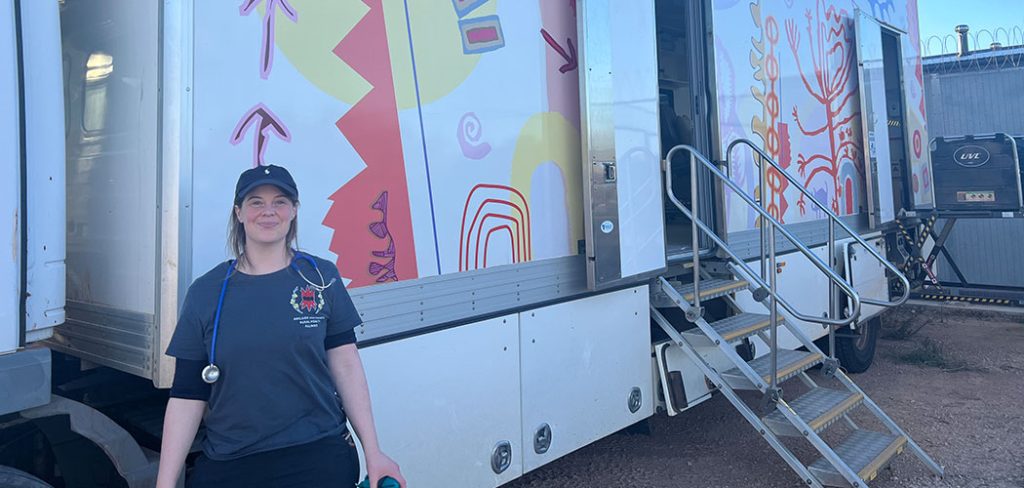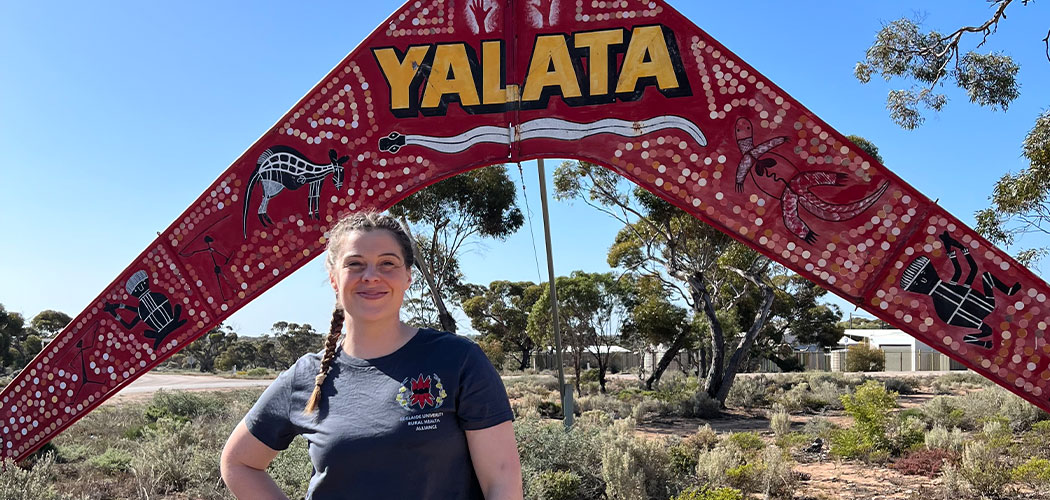Each year, the Adelaide University Rural Health Alliance (AURHA) – the rural health club for students undertaking a health-related degree – organises the Yalata Kidney Health Festival.
The outreach initiative involves a group of about a dozen students who travel to the remote Indigenous community of Yalata, South Australia. The students engage with the community, focusing on improving kidney health, and gain a deeper understanding of cultural competency and the broader health challenges faced.
Aboriginal and Torres Strait Islander Peoples have one of the highest rates of chronic kidney disease in the world. Last year’s trip coincided with the SA Health dialysis truck’s visit, enabling both volunteers and younger community members to understand the end stage renal failure management process many older relatives and friends know all too well.
Graduate nurse Jocelyn McCarthy, who was undertaking a Master of Clinical Nursing degree at the time, jumped at the opportunity to take part. Originally from New Zealand, Jocelyn learned more about Australia’s First Nations Peoples through one of the degree’s subjects on Aboriginal people in healthcare.
“I remember hearing about the health disparities and terrible things that happened in the not so distant past and being quite shocked,” she recalls.
“After the course, I started to see racism casually in society around me and from then on I wanted to be part of change that’s going to make things better for these people.”
Students spend about a week in the region, first visiting both the Port Augusta and Ceduna regional hospitals before moving along to Yalata. Volunteers are assigned a classroom and assist teachers with their daily subjects. Each volunteer also spends a day at the nursing post, developing their cultural competency and experiencing the challenges of remote healthcare first-hand.

On a stop in Port Augusta, Jocelyn vividly remembers seeing rows of dialysis chairs at the local unit, highlighting to her the level of widespread disease. It was a similar story in nearby towns.
“The one story that probably sticks with me the most is this lady who didn’t have a chair in Ceduna or Port Augusta. So, she goes all the way to Adelaide to get her dialysis. She was able to come back to Yalata for that week to see her son.
“It was so sad. I can’t believe our health system is structured in such a way that it is necessary for her travel nine hours away from her family to access the health services she needs.”
Jocelyn says it was one thing to feel empathy for Indigenous peoples upon learning about health disparities during her nursing degree and something else entirely to observe it upfront within the community, including meeting a 16-year-old girl with rheumatic heart disease.
“The trip really evoked a change in my outlook and understanding in relation to indigenous health,” she says.
Currently undertaking her graduate year as a registered nurse at Flinders Hospital, Jocelyn believes that the trip to Yalata improved her grass-roots knowledge of indigenous health, social determinants, and the need to improve outcomes.
“When you meet community members in person and meet the people that are affected, it adds another layer to it. You have so much more empathy and compassion and it’s harder to ignore the uncomfortable truth. You are no longer as blind to the real suffering,” says Jocelyn.
“In relation to Aboriginal health and care, it is my view that the current narrative often blames chronic conditions on poor diet and lifestyle choices. [But] when I went to Yalata, it was reaffirmed to me that this couldn’t be further from the truth. It is so much more complex; the effects of colonisation and past events have infiltrated all determinants of health. It’s not something that can be fixed in a year or two and the aftershock of those events are still being felt and we need to do our best to support and nurse in the best way possible”.









2 Responses
I am Digvijay (DJ), an international student at The university of Adelaide. I am in 2nd year of Bachelor of Nursing. I would like to know more about Yalata Kidney Festival. How can I apply or how to get the application for.It would be great to know brief about dates, duration, eligibility, and Festival itself.
Regards
DJ
Hi DJ, you can email yalatakhf@gmail.com to enquire about the festival.